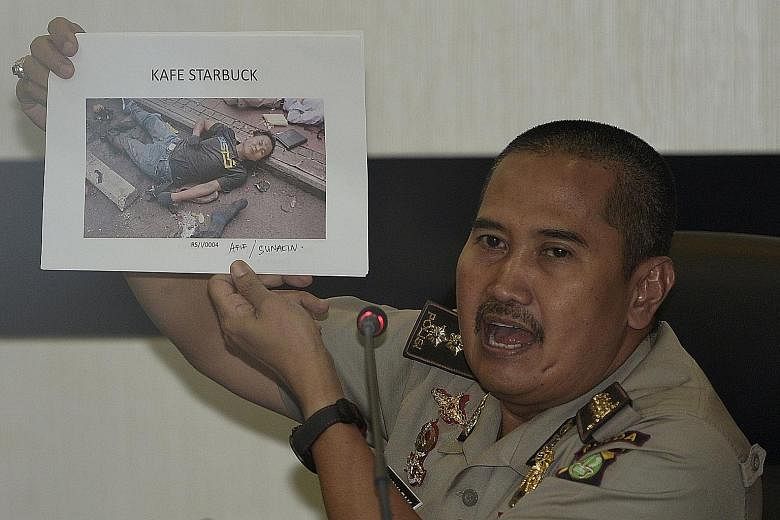JAKARTA • Indonesian President Joko Widodo is considering a regulation that would prohibit Indonesians from joining radical groups overseas, in an effort to prevent a deadlier attack than last week's militant assault on Jakarta.
At a meeting yesterday at the palace, top political and security officials agreed to review anti-terrorism laws, which currently allow Indonesians to freely return home after fighting in Syria with the Islamic State in Iraq and Syria (ISIS).
Security forces fear that returning fighters could launch a much more calculated attack than the amateurish assault militants launched on Thursday last week using two pistols and 11 low-yield homemade bombs.
Eight people were killed in the attack, including the four attackers.
"We've agreed to review the terrorism law to focus on prevention," parliamentary speaker Zulkifli Hasan told Reuters.
"Currently, there is nothing in the law covering training. There is also nothing currently covering people going overseas (to join radical groups) and returning. This needs to be broadened."
Proposed revisions would also tighten prison sentences for terrorism offences, he said.
Coordinating Political, Legal and Security Affairs Minister Luhut Pandjaitan told reporters the new regulation would allow suspects to be temporarily detained.
"The point is to give police the authority to pre-emptively and temporarily detain (a suspect) while they get information to prevent future incidents," Mr Luhut said, adding the detention could last up to two weeks.
Mr Joko said discussions on the new regulation, which would be a stop-gap measure until parliament can revise its anti-terrorism law, were still at "an early stage".
"This is very pressing. Many people have left for Syria or returned," he said, but did not say when a decision would be made.
Police believe the alleged mastermind of the Jakarta attack, an Indonesian fighting with ISIS in Syria called Bahrun Naim, used social media to communicate his radicalideas to followers in Indonesia.
Jakarta Post newspaper reported yesterday that Bahrun has reactivated a defunct blog and published two posts on Monday, saying the attack was carried out by ISIS to target police - whom he accused of killing Muslims without trial - as well as foreigners.
Hundreds of Indonesians are believed by the authorities to have travelled to the Middle East to join ISIS. About 100 are believed to have returned, most of whom did not see frontline combat.
Indonesian Police Chief Badrodin Haiti told Reuters in an interview on Monday that the country was bracing itself for the return of these more experienced fighters, who may be capable of carrying out far more sophisticated operations than last week's attack, which was hampered by poor training and weapons.
"There is the possibility (of a bigger attack) if they can train people in preparing explosives," he said.
In the wake of the latest attack, police will redouble efforts to monitor radical networks in Indonesia.
Two terror networks, who Gen Badrodin identified only as Bekasi and Cirebon groups, are suspected of involvement in Thursday's attack, which was the first in Indonesia to be attributed to ISIS.
"The Bekasi and Cirebon groups have strong communication," he was quoted as saying yesterday by online news portal kompas.com.
But even if the new revisions are imposed, Indonesia would still have weaker anti-terrorism laws than some of its neighbours.
Malaysia last April passed a law reintroducing detention withouttrial, three years after a similar measure was revoked.
Australia has in recent years passed measures banning its citizens from returning from conflict zones in Syria and the Middle East, while making it easier to monitor domestic communications.

